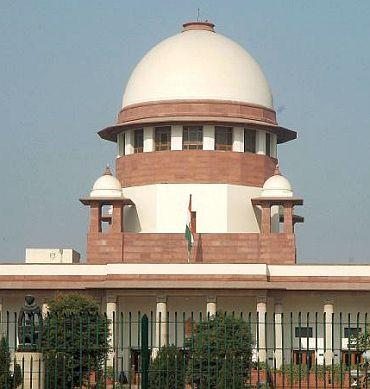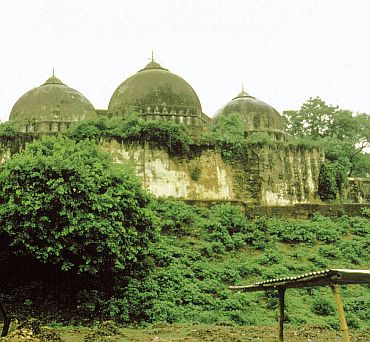
The Supreme Court on Monday stayed the Allahabad High Court's verdict dividing in three parts the disputed Ram Janmabhoomi-Babri Masjid site in Ayodhya, terming as "something strange" the judgement although the parties had not asked for trifurcation of the land.
The court, while staying the September 13, 2010 judgement of the Lucknow bench of the high court, ordered status quo at the site.
A bench of justices Aftab Alam and R M Lodha, while terming the high court's judgement "as something strange," said the partition of the land was ordered despite none of the parties to the dispute seeking it.
While directing that there shall be no religious activity on the 67 acre land, acquired by the central government adjacent to the disputed structure, the apex court bench said the status quo shall be maintained with regard to the rest of the land.
In the wake of the court's order, prayers at Ram Lala's make-shift temple at the disputed site in Ayodhya would be going on as usual.
...

The Lucknow bench of the high court had in September last year passed the verdict directing partition of the 2.77 acre on which the disputed structure once stood into three parts among Muslims, Hindus and Nirmohi Akhara.
"A new dimension was given by the high court as the decree of partition was not sought by the parties. It was not prayed by anyone. It has to be stayed. Its a strange order," the bench said.
Expressing surprise over the high court's verdict, the bench observed, "How can a decree of partition be passed when none of the parties had prayed for it.
"Court has done something on its own. It's strange. Such kind of decrees cannot be allowed to be in operation," the bench said while staying the high court's verdict.
Petitioners Wakf Board and Jamait Ulama-I-Hind have submitted that the high court's verdict should be quashed as it was based on faith and not on evidence. It contended that the court has committed an error by holding that the building stood at the place of birth of Ram.

They submitted that claims of Muslims, Hindus and Nirmohi Akhara over the controversial site are mutually exclusive and cannot be shared.
"It was nobody's case in the high court that the Muslims, Hindus and Nirmohi Akhara were in joint possession of the disputed premises. The claims of the three sets of plaintiffs were mutually exclusive in the sense each set of plaintiffs claimed the entire property as its own and no one sought a decree for partition of the property," the appeals said.
The Hindu Mahasabha, on the other hand, has sought only partial annulment of the majority verdict of the high court, which ruled for handing over one third of the disputed site to Muslims. It sought the apex court's endorsement of the September 30 minority verdict by Justice Dharam Veer Sharma who ruled for handing over of the entire land to Hindus.
"Set aside the judgement dated September 30, 2010 by Justice S U Khan and Justice Sudhir Agarwal to the extent that one third of the property in dispute has been declared in favour of Muslims and to allot share to them in the decree," said the Hindu Mahasabha in its petition.

A three-judge bench of the high court's Lucknow bench had passed three separate judgements on September 30 with the majority verdict holding that the area covered by the central dome of the three-domed structure, where the idol of Lord Rama is situated, belongs to Hindus.
While justice Khan and Agarwal were of the view that the entire disputed land should be divided into three parts -- one part each to Sunni Waqf Board, Nirmohi Akhara and the parties representing 'Ram Lalla Virajman', Justice Sharma had held that the entire disputed area belongs to Hindus.
Earlier, a Delhi MLA Shoaib Iqbal had also filed the appeal in the apex court but the Supreme Court refused to entertain it saying the petition "is misconceived. Hence dismissed."